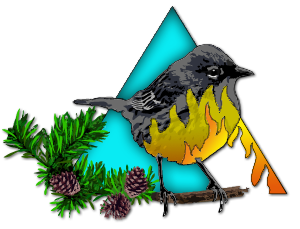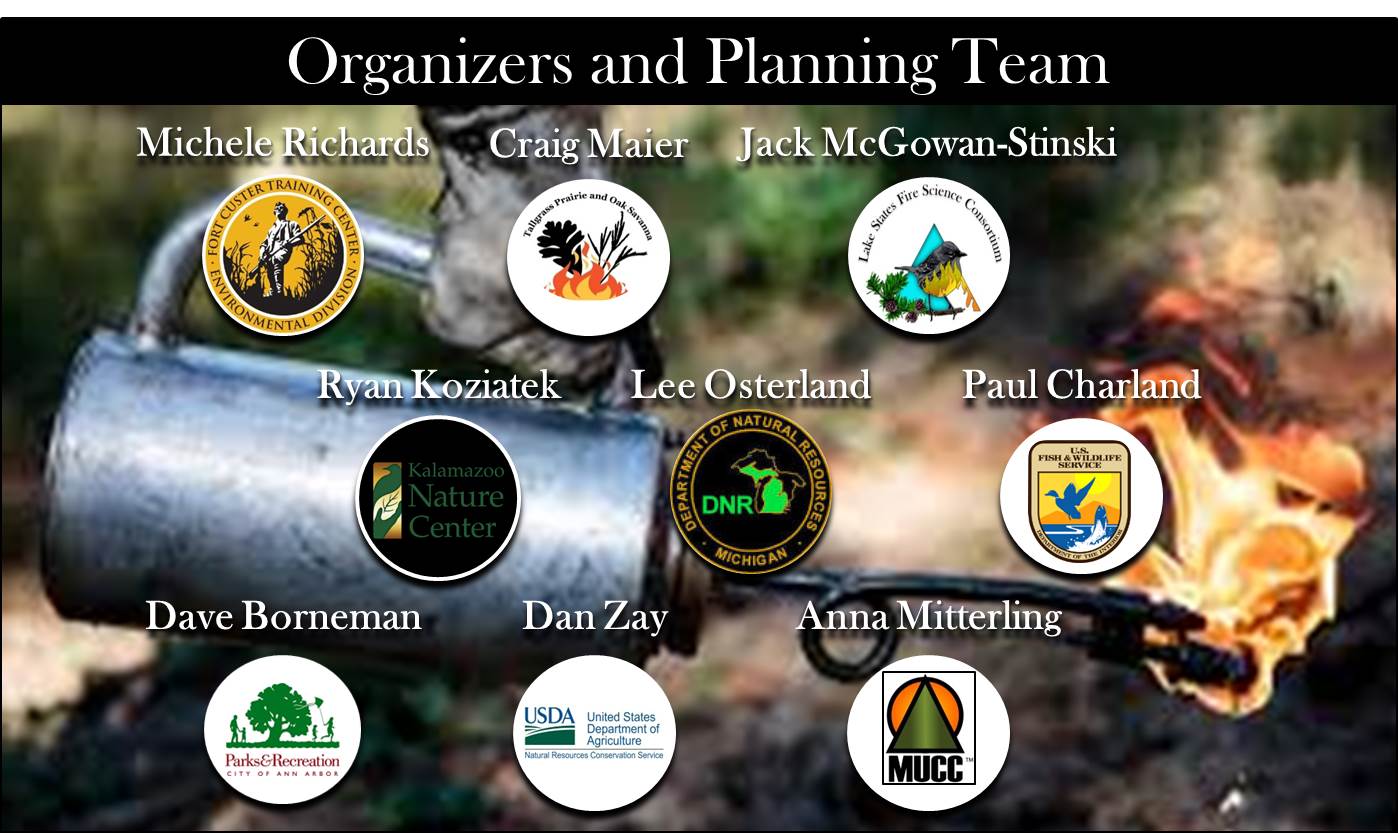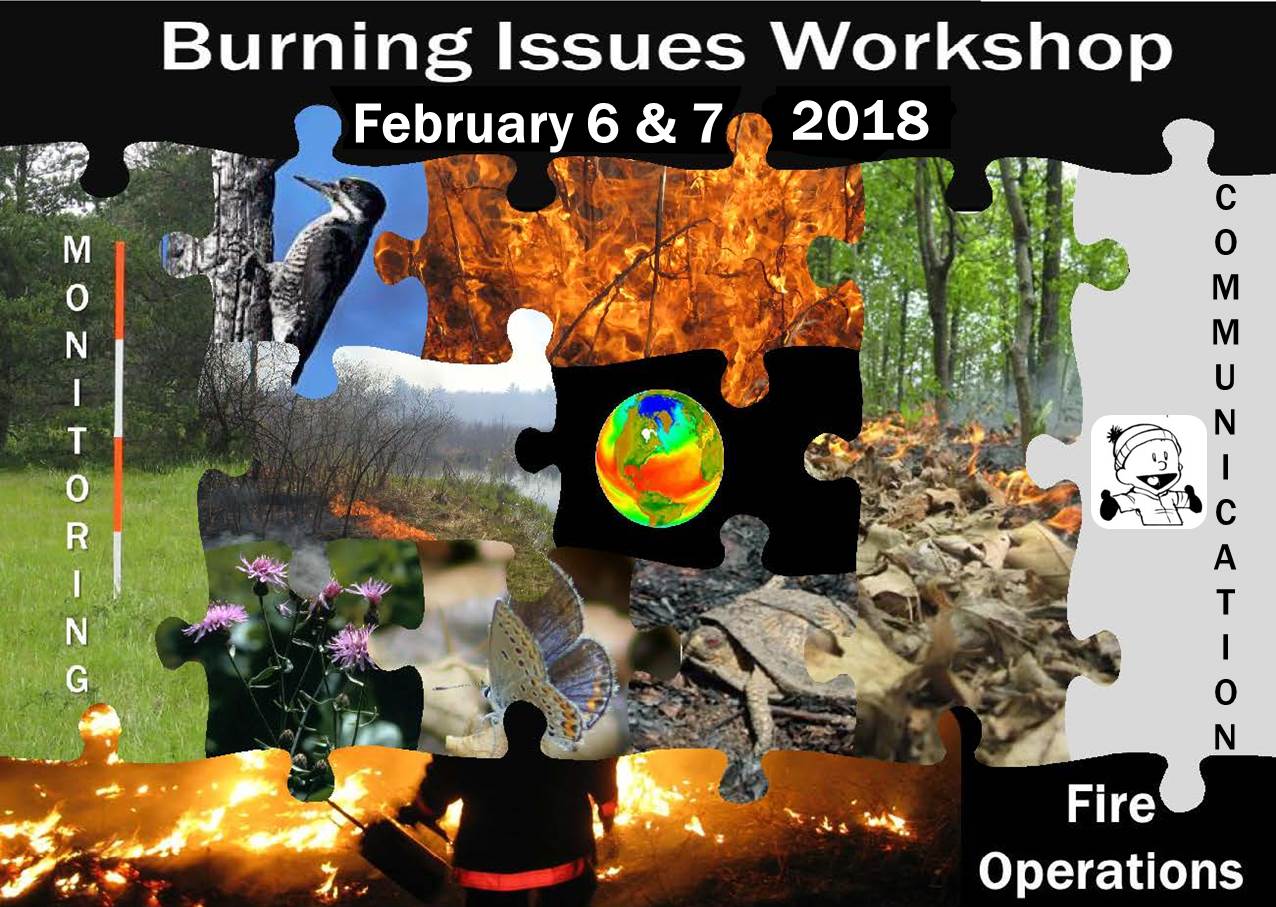Navigation

Upcoming Events
There are no events planned.
Fourth Annual Burning Issues Workshop and Michigan Prescribed Fire Council Annual Meeting
“Breaking Burning Barriers”
This annual wildland fire workshop is designed to enable land managers, researchers, resource specialists, biologists, ecologists and fire practitioners an opportunity to hear and learn from different areas of expertise in a format designed to identify gaps in knowledge and communication, and work toward solutions to issues that complicate our collective wildland fire work.
When: February 6 & 7, 2018
Location: Fort Custer National Training Center (FCTC), 1109 Denso Rd, Battle Creek, MI 49037 (42.329729, -85.287916)
General Agenda:
Over the two days we will explore topic areas that are relevant across the State of Michigan and the Upper Midwest, and have interactive opportunities such as panel discussions and a world café. These discussions and sessions are planned with and for the diverse community interacting around fire-related issues, and seek to build the understanding and communication to support further work toward collaborative solutions.
The four topic areas we will cover over the 2-day workshop include:
1. Managing for Wildlife in Fire-dependent Ecosystems
Presenters and Panel include: Dr. Gary Roloff (Department of Fisheries and Wildlife, Michigan State University), Dr. John Shuey (Director of Conservation Science, The Nature Conservancy, Indiana Field Office), and Tracy Melvin (Department of Fisheries and Wildlife, Michigan State University)
2. Managing Oak Ecosystems with Fire
• Overview Presentation on Managing Oak Ecosystems with Fire in the Eastern U.S. by Daniel C. Dey, PhD, Research Forester, Project Leader, U.S. Forest Service, Northern Research Station
• Panel Discussion on the MI DNR’s approach to Oaks and Fire Management by Jesse Bramer, Mark Sargent, and Paul Rogers
3. Managing Fire-Dependent Systems with Invasive Species Considerations
• Presenters and Panel include Dr. Jessica Miesel (Department of Plant, Soil and Microbial Sciences, Michigan State University) and Glenn Palmgren (MI Department of Natural Resources)
4. Managing a Burn Program: Exploring the risks, barriers, and opportunities in developing and sustaining a burn program
• Presenters and Panel include Brian Schaffler (Fuels Management Specialist, Fuels Program, USDA Forest Service, Eastern Regional Office) and Trent Wickman (Air Resource Specialist - MN,WI,MI, USDA Forest Service, Eastern Regional Office)
• World Café interactive session
Working Detailed Agenda as of December 13, 2017
|
February 6 |
9:00-10:00 am |
ARRIVAL AND CHECK-IN |
10:00-10:30 am |
Welcome; Overview of past Burning Issues and goals for 2018 Workshop; Update on Michigan Prescribed Fire Council and the “Passing of the Torch” to the new Chair |
10:30 am-12:00 pm |
Presentations and Panel Discussion: Managing a Burn Program: Exploring the risks, barriers, and opportunities in developing and sustaining a burn program |
12:00-1:15 pm |
LUNCH |
1:15-2:30 pm |
World Café Session for Managing a Burn Program |
2:30-3:00 pm |
SNACK BREAK |
3:00-4:30 pm |
Presentations and Panel Discussion: Managing for Wildlife in Fire-dependent Ecosystems |
4:00-4:30 pm |
Day One Wrap Up |
4:30-6:00 pm |
Michigan Prescribed Fire Council HAPPY HOUR |
|
February 7 |
8:45-9:00 am |
Welcome back |
9:00-10:00 am |
Overview Presentation Managing Oak Ecosystems with Fire in the Eastern U.S. |
10:00-10:30 am |
SNACK BREAK |
10:30 am-12:00 pm |
Panel Discussion: MI DNR’s approach to Oaks and Fire Management |
12:00-1:00 pm |
LUNCH |
1:00-3:00 pm |
Presentations and Panel Discussion: Managing Fire-Dependent Systems with Invasive Species Considerations |
3:00-3:30 pm |
WORKSHOP WRAP-UP |
Registration: Thanks to Fort Custer Training Center (FCTC) we are able to keep costs low with a reasonable registration fee (includes lunch, snacks and coffee both days): Regular registration is $65 and a Reduced Rate registration for students/volunteers/private landowners is $35. Please contact Jack McGowan-Stinski to get the reduced rate Promo code; reduced rate is limited quantity.
Registration Link: http://events.constantcontact.com/register/event?llr=vhr65vnab&oeidk=a07eefqwvvcafa62e8a
Lodging: Available at FCTC at a maximum rate of $50/night. Other lodging options are located in Kalamazoo, MI. Note: Rooms at FCTC are semi-private; a single twin bed with a shared bathroom (toilet and shower) with one adjacent room. Call 269.731.6126 to reserve your lodging.
For any questions please contact Jack McGowan-Stinski, mcgowan-stinski.1@osu.edu, 989-287-1734
Federal Training
Travel in conjunction with educational activities to become proficient or qualified in one or more areas of responsibility. 5 USC 4101(4) states that “‘training’ means the process of providing for and making available to an employee, and placing or enrolling the employee in a planned, prepared, and coordinated program, course, curriculum, subject, system, or routine of instruction or education, in scientific, professional, technical, mechanical, trade, clerical, fiscal, administrative, or other fields which will improve individual and organizational performance and assist in achieving the agency’s mission and performance goals.” - and - b) More than half of the time is scheduled for a planned, organized exchange of information between presenters and audience which meets the definition of training in section 4101 of title 5, United States Code.
Organizers and Planning Team:
Michele Richards – Michigan National Guard and MI RX Fire Council
Craig Maier –Tallgrass Prairie and Oak Savanna Fire Science Consortium
Jack McGowan-Stinski – Lake States Fire Science Consortium and MI RX Fire Council
Ryan Koziatek – Kalamazoo Nature Center and MI RX Fire Council
Lee Osterland – Michigan DNR and MI RX Fire Council
Paul Charland – U.S. Fish and Wildlife Service
Dave Borneman – Natural Area Preservation (NAP) Manager City of Ann Arbor and MI RX Fire Council
Dan Zay – Natural Resources Conservation Service and MI RX Fire Council
Anna Mitterling – Michigan United Conservation Clubs and MI RX Fire Council

The 2018 Burning Issues Workshop is hosted and sponsored by: Michigan National Guard, Michigan Prescribed Fire Council, the Lake States Fire Science Consortium, and the Tallgrass Prairie and Oak Savanna Fire Science Consortium.


.png)
